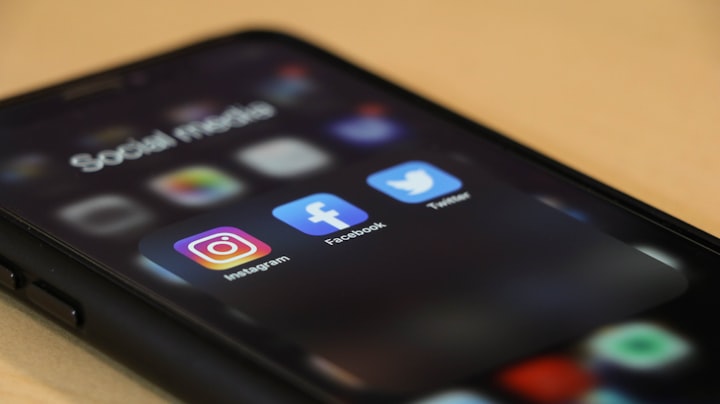The fine art that is staying untriggered
social media doesn't have to control your mood
Untriggered: adjective, meaning "not triggered"
Social media is a blessing and a curse.
On one hand social media represents a way to connect with one another.
A way to share our experiences, our struggles and triumphs, and tips to help make one another's lives easier.
But on the other hand, all the sharing can have the opposite effect. It can cause division and act as a weapon, opening already vulnerable people up to harsh criticism from strangers. Criticism that is often unfounded, based on opinions made on a snap judgement of a single post or 30 second video.
These days it feels like just opening a social app is to open yourself to an onslaught of negativity and a sure fire way to ruin your day.
And that's not even taking into account what happens in my own personal ninth circle of hell; comment sections.
The simplest of posts will be followed by a comment section full of people at war. Often over things that are purely matter of opinion anyways, and sometimes finding their way to topics that the original post they are commenting under had absolutely nothing to do with.
Some truly baffling mental gymnastics have been taking place in recent years as a way to allow people to project a personal issue onto a TikTok about something seemingly harmless enough.
It's disheartening to say the least, and it's the reason many people have been taking steps in recent years to distance themselves from social platforms altogether.
In a time when more people than ever are struggling with their mental health, staring at a screen where complete strangers are yelling at each other certainly doesn't help put your mindset back into a happy place.
It turns out there's a reason why social media is so triggering.
I mean kind of.
Some scholars have theorized that social media triggers dissociation.
Most of us experience dissociation at some point, especially while doing mindless tasks like washing dishes, or while doing something very engaging like playing a game or watching a good movie.
Two things happen when we dissociate.
1) The passage of time feels reduced.
I think we all know this one. For me from the age of about 11 up until now it's anytime I play any iteration of The Sims. That game has taken more hours of my life than I really ever want to know.
2) Our sense of reflectiveness/self-awareness or consciousness is reduced.
Now this one might not be a huge deal when you are say, to keep with the example, playing a solo player game on your own. Sometimes it's nice to give your brain a little break.
But on the internet where the things you do and say and see are affecting both you and other people this can be a problem.
Some of the tricks these apps use to capture our attention in the first place is built off the same idea used in casinos and with slot machines.
Think about how often you pull down to refresh for example. When you release you either get a new feed with new content or if you've been there already too long, you don't.
This is thought to be taking advantage of our "attraction to unpredictability".
And then of course there's the "neurocognitive reward system."
AKA everyone's new favorite thing to talk about, dopamine.
Dopamine is not in and of itself bad. You can get dopamine hits from good things too. For me everytime I tick an item off a to-do list I get a rush. Which is why every single task of my life goes on a to-do list.
But the human brain isn't able to tell the good from the bad which means that we will also get dopamine from habits that are unproductive, or objectively bad, or just downright destructive to our bodies in a very literal sense.
There's also a lot of interesting information out there about "negativity bias". In a nutshell, in the context of media, this is the idea that things with negative words in the title are more likely to get clicks.
Negativity bias in media is a whole topic in and of itself with many layered aspects to it, so I won't go too deep into it here. I'll simply say, the fact that the word clickbait is such a commonly used term today I think lends a lot of credit to the idea of negativity bias being at least somewhat true.
What gets clicks isn't always good for our minds. In fact I'd argue more often than not it absolutely isn't.
So where's the good news?
Well the good news is, as with everything in a consumer driven society we can either let it swallow us or we can fight back. And how do we fight back?
By being more engaged and active consumers.
Personally I made the choice that if I am going to have social media in my life I need it to be as clean and uplifting as I can possibly get it.
This doesn't mean I can't have hard conversations or listen to anothers point of view.
This means I'm only going to entertain those conversations in good faith. In spaces and with people who I can on some level know are actually going to be willing to hear me and equally, if not, more important, who I am in a good headspace and ready to hear myself.
If I am not ready to listen first, and respond only once I've fully listened and digested, then why would I expect the same of anyone else?
Clean and uplifting social spaces to me means that if I see a call to action and feel the overwhelming need to help do something about a problem, I am going to find an actionable way to help. Rather than argue with someone online who is not in support of my cause or who maybe is just there to argue for the sake of arguing.
Then finally I am going to STAY THE HELL OUT of comment sections.
Seriously, this time.
(Can you tell I struggle with this one?)
Personally, I'm not really a "commenter" myself. More an avid reader of comments. So then I can just stew over the opinions of strangers and have fictional conversations with myself in the shower where of course... I always come off very witty and intelligent and am always right.
It seems most people in comment sections also feel they are right. Even when they are quite literally wrong. The line between fact and opinion has ceased to exist online. They are one and the same.
But I don't have to let that ruin my day.
You don't have to comment on everything. You really don't, I promise. I say this as a reminder to myself too.
Not everyone wants to know what you are thinking. Not everyone cares. Even if it's really good. Like really good. That's what our own platforms are for.
You are never going to change someone's mind online who has already decided that they want to disagree with you, and you might just raise your own blood pressure in the process. It's not worth it. I prefer now to only entertain good faith arguments, which are really better called discussions, if they are truly being held in good faith. And preferably with people I know in person.
Truly, I have been focused on just completely not reading comment sections in general. Unless of course it's on my own work.
This is a challenge but I've realized if I see a post and feel the need to know what other people think anyways, it's probably because something has triggered me.
I'm better off sitting with the material on my own and giving my brain a chance to digest it better. And maybe after, and only after that, sharing it with friends or family with a simple, "what do you think?" Or reposting to my own socials, "interesting, what do you think?," for a little wider of a pool of opinions.
Either way, immediately jumping into the comment section of a post I feel negatively towards has never done anything but made me feel more negative so I'm really just trying to stay away now and it's a struggle but made much easier by using tools that already exist on our phones and apps despite many of us not even knowing they are there.
I utilize screen limits.
I don't think I even knew about this feature on my phone until a few years ago but it has helped me enormously. Of course, there's still a certain level of responsibility on you to not just ignore the screen limit. But letting my phone lock me out of things has at least helped me become aware of the passage of time, how quickly it goes, and how many better and happier things I could've done with that time if I hadn't been doom scrolling.
I've also tried scheduling my social media time into my day. I do this particularly for viewing my own socials and responding to messages or comments. That way I have one part of the day specifically planned to address comments and after that I'm done for the day.
I've turned off notifications. My friends send me like a minimum of 10 reels a day on instagram. I have always been a fan of reviewing things in batch vs piecemeal anyways.
All 10 reels will still be there ready to receive a heart tomorrow.
I've tried a lot of tips and still sometimes it's a struggle. I've deleted several platforms but there's always something that makes you feel tied to one or the other. One random family member or old school friend you haven't actually talked to in years but you just want them to know you are there in case they want to reach out.
I can probably just find their current address and send them a letter in the mail. I can be the one who reaches out to them if I really think it's that important.
I don't know. I don't know what more I can do.
I just know I can't do this anymore. I can't do the negativity and the ego and the lack of basic human compassion. I understand we were inside for 2 years but c'mon.
There's a lot of good social media has given us, but it's also taken so much away from us.
We have to reassess and locate our humanity if we ever had it in the first place and it's not going to be found exclusively digitally.
Join a book club, play a sport, be an activist irl. Meaning if you are physically able, get off your phone and out into the world to volunteer, rather than just telling people online you care about something.
Seriously y'all I get it. I'm an introvert too. And I would love nothing more than to spend 90% of my life indoors with my cats and a good book.
But the other 10%, I know I have to push myself to go out. To people watch and observe and find those little reminders that no matter what the internet is making it seem like, there is still a world full of people who are living and laughing... and loving (just kidding).
But seriously. We are all just living life how we know best based on our own experiences and it's easy to forget when you only see someone as a screen name and a profile pic there's a real person behind the computer on the other side of that post, comment, video, etc.
I find it's a lot easier to learn to empathize with that person when you have to look them in the eyes.
____________________________________________________
Links to articles used for reference below:
https://www.scientificamerican.com/article/why-social-media-makes-people-unhappy-and-simple-ways-to-fix-it/
https://www.sciencefocus.com/future-technology/trapped-the-secret-ways-social-media-is-built-to-be-addictive-and-what-you-can-do-to-fight-back/
https://www.niemanlab.org/2023/03/negative-words-in-news-headlines-generate-more-clicks-but-sad-words-are-more-effective-than-angry-or-scary-ones/
About the Creator
Ariel Joseph
I love to write pretty much everything and anything, except a profile page bio.
Enjoyed the story? Support the Creator.
Subscribe for free to receive all their stories in your feed. You could also pledge your support or give them a one-off tip, letting them know you appreciate their work.







Comments
There are no comments for this story
Be the first to respond and start the conversation.